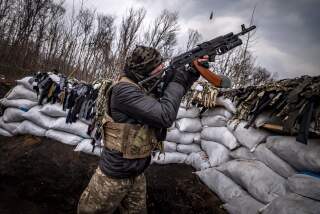To Intervene or Not to Intervene
- Share via
The question of whether and when the United States should intervene abroad came up during the presidential and vice-presidential debates, but the answers were usually puzzling. However, circumstances may require a clear answer because, for example, U.S. troop deployments in Kosovo are likely to extend well beyond their originally intended duration.
U.S. interventions have taken a wide range of forms: peacekeeping (Bosnia in the past five years); peacemaking (Kosovo in the past 16 months); “operations other than war” (Somalia, Haiti and Rwanda); and humanitarian assistance in militarily insecure circumstances (all of the above). In the lexicon of military planners, these operations are collectively referred to as “small-scale contingencies,” in contrast to operations designed to deter or to meet “major theater wars.”
At the end of 1999, the U.S. had 253,000 military forces deployed in foreign countries. Most of them are stationed in 11 countries belonging to the North Atlantic Treaty Organization, plus Japan and Korea, and reflect America’s alliance and treaty obligations. Nevertheless, it is the smaller deployments--Bosnia and Herzegovina (5,800), Serbia including Kosovo (6,400), Macedonia (1,100) and in the Middle East (13,000), a legacy of the Gulf War in 1991--that account for a disproportionate share of the stress and fatigue under which the military establishment currently labors.
There are numerous reasons for this. Families are not allowed in these deployments, a restriction that coincides with a peak in the percentage of married men and women serving in the armed forces. Repeated and protracted separations have disruptive effects on families and on service morale, which add to the services’ difficulties in meeting their retention and recruitment goals.
For years, the U.S. military establishment has been sized and configured to deal with major wars, specifically, two simultaneously occurring conflicts in Northeast Asia and the Middle East. It thus assumes that if two major wars can be effectively managed, an unspecified number of smaller deployments, as in Bosnia, can also be handled, because these kinds of deployments are presumed to be less demanding of military capabilities.
Yet, just how effective have these smaller-scale deployments been? Such interventions typically occur in countries whose politics and ethnic tensions are neither well-understood nor effectively managed by foreign policymakers, military forces and cumbersome bureaucracies. The ability of the United States to ameliorate these situations, let alone to resolve the issues at stake, is severely limited and beset by uncertainties and perverse consequences. The sobering ambiguities were strikingly portrayed in a cover photograph in the London Economist last year, which showed a bereaved Kosovo woman below a caption that posed the question: “Victim of Kosovo or NATO”?
Opponents of U.S. intervention--the “realist” school--contend that military deployment abroad should occur only when “vital national interests” are at stake, apart from humanitarian considerations, and whether the contemplated actions are multilateral or unilateral. Furthermore, goes the argument, the interventions in Somalia, Haiti, Rwanda, Bosnia and Kosovo didn’t pass this stringent test, although actions in the Persian Gulf to repel Iraq’s invasion of Kuwait did.
Supporters of intervention--the “idealist” school--reply that humanitarian considerations, including the furtherance of ethnic and religious tolerance, protection of human rights and the advancement of democracy, represent core American values. Hence, tangible support for these values is itself a vital national interest.
During the presidential debates, Texas Gov. George W. Bush inclined toward the non-interventionist, realist position, while Vice President Al Gore supported a more active, idealist U.S. role overseas. Yet, one important, if perhaps nuanced, element was missing in their exchanges.
The Hippocratic oath instructs doctors to “above all, do no harm.” This is too exacting an standard to be applied to military intervention, because these situations defy precision and certainty. Nevertheless, when U.S. policymakers contemplate intervention abroad, they should do so with abundant humility, if not timidity, because of the profoundly uncertain connections between the blunt instruments they can use and the complex ends they seek.
Perhaps there are ways to hone these instruments so they can be used with greater dexterity and less risk of inflicting inadvertent harm. One way, an adaptation of what once was referred to as the Nixon doctrine, is to equip and train the victims of a local conflict (for example, the Bosnians brutalized by the Serbs), instead of committing intervention forces from outside. A second approach is to earmark a part of U.S. military forces for smaller-scale interventions, training and equipping them to maximize their effectiveness in such contingencies. Neither of these measures is riskless, but they may still be better than the alternatives.
Even if the Hippocratic oath is unsuitable to determine the propriety of an contemplated intervention, there is a corollary that should be obligatory: Recognize that harm will be an inevitable consequence of intervention and , therefore, try to demonstrate convincingly, before deployment occurs, that such harm will be substantially less than the desired, although uncertain, improvement sought.
From the standpoint of U.S. policy, a cautionary admonition by Abraham Lincoln is also relevant: “We should not promise what we ought not, lest we be called upon to perform what we cannot.”
More to Read
Sign up for Essential California
The most important California stories and recommendations in your inbox every morning.
You may occasionally receive promotional content from the Los Angeles Times.










